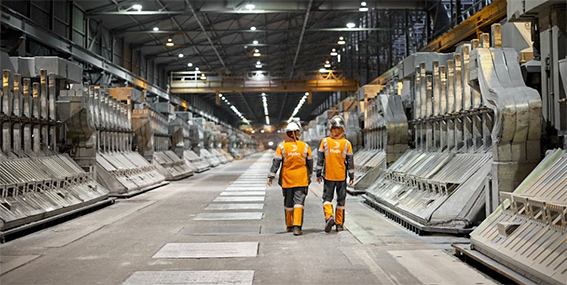The national budget proposal, presented by the Norwegian government on Friday, October 6, includes several elements that affect Hydro’s operations in Norway. The most significant impact is on the CO2 compensation system. Hydro is surprised and disappointed by the weakening of the regime. The proposed wind energy taxation does not help to trigger sufficient investments to ensure adequate energy supply for industry and the ecological transition.
The total impact of the changes to the CO2 compensation scheme for Hydro in 2023 is estimated to be a reduction of approximately NOK 1 billion. Hydro is concerned about the negative signaling effect that constant government changes have on the predictability of the Norwegian industry.
“We are surprised and disappointed that the Government has once again chosen to weaken the competitiveness of industry by cutting the established CO2 offset scheme. This is regrettable and undermines the predictability of Norwegian industrial policy,” said President and CEO Hilde Müller.
said President and CEO Hilde Merete Aasheim.
According to Aasheim, the aim of the CO2 offset scheme is to create a level playing field with other countries and to prevent carbon leakage, i.e., for energy-intensive industries to shift their production to countries with higher CO2 emissions.
The CO2 offsetting scheme is part of the EU emissions trading system. The scheme partially offsets the additional energy costs incurred by industry due to European CO2 prices affecting Norwegian energy prices. In Norway, Hydro uses 100% renewable energy that does not emit CO2 in its aluminum production.
In the state budget proposal for 2024, the government suggests a further weakening of the CO2 compensation scheme for industry, almost doubling the minimum CO2 quota price from NOK 200 per ton, which was introduced in 2022, to NOK 375 per ton by 2023. The total impact on Hydro in 2023 is estimated to be approximately NOK 1 billion.
Accordingly, Hydro should write off part of the compensation calculated above for the first and second quarters of 2023 with approximately half of this amount, and record approximately corresponding lower amounts for the third and fourth quarters. The state budget will be debated in the Norwegian Parliament during the autumn and the final budget decision is expected in December.
In addition, the minimum price for quotas in the CO2 offset scheme was introduced for the first time in the 2023 state budget, and in the draft budget presented in the fall of 2022, the government stated that the CO2 offset scheme was now “sustainable in a time of tighter economic constraints.” The Government was also to invite the industry to a dialogue on how to further develop the scheme. This has been the basis for Hydro’s provisions in the accounts for 2023 and for the new investments planned by the company.
“Last year the government presented a level of compensation towards 2030 in which it made it clear that the CO2 compensation scheme was to remain unchanged. It is therefore unfortunate for confidence in political decisions that this is no longer the case and will be changed again at the first opportunity. It is also very regrettable that the Government has not followed the process and dialogue on the scheme, as it promised the industry it would.”Aasheim added.
“We are planning major investments in new technologies to reduce CO2 emissions and create greener products that the world needs. A robust and predictable CO2 offset system is one of the most important prerequisites for industry to continue to invest in Norway, enabling us to create value and jobs based on renewables.The Norwegian Parliament must come together now and provide stability to the CO2 offset regime until 2030, so that industry can regain the predictability essential for further industrial development.”said Aasheim.
The government proposes further changes to energy taxation.The high price contribution (høyprisbidraget) for hydropower is abolished as of October 1, 2023.A basic income tax of 35% is introduced for wind power, which is slightly lower than the government’s original proposal of 40% and still not investment neutral. It is crucial for developers of new renewable energy and for the industry that the actual contract price is the basis for the basic income tax (grunnrentebeskatning).
“It is positive that the government will eliminate the high price contribution starting in October. However, it is disappointing that the government has not listened to the industry and the renewable energy sector and addressed the taxation of wind energy. The wind energy tax proposal also does nothing to trigger sufficient investment to ensure adequate energy supply for industry and the ecological transition.” Aasheim concluded.













